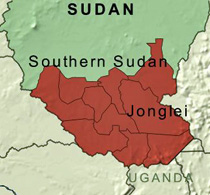Geneva
08 August 2009
 |
The World Food Program says it is concerned the assaults last Sunday in Jonglei State could cause retaliatory attacks and this could lead to more deaths and to more people fleeing their homes.
There is a history of tribal clashes in this region. In March and April, inter-tribal fighting killed more than 700 people and displaced 19,000 in Akobo and Pibor counties.
WFP spokeswoman Emilia Cassela says increased fighting in recent months is making it riskier to deliver humanitarian assistance to people in the area.
"Some of you may recall that in June there was an attack on the Sobat river, which effectively prevented food assistance from being delivered by river," she said. "And, since then, the World Food Program has conducted 80 airlifts to provide food for 18,000 people in that particular area. I want to specify airlift and not airdrops. So that is when the plane actually lands and we are able to unload the food. And, that is out of a total of about 29,000 people in the Akobo county that are receiving food assistance."
Cassela says the World Food Program has delivered 117 metric tons of food to the region this month and hopes to deliver a total of 435 metric tons in August. She says it is not possible to deliver aid to the region by road because of insecurity and the rains, which make the roads impassable.
So, she says airlifts are currently the only way that food can be brought to the displaced and other vulnerable people there.
"We are getting food there," said Cassela. "But, that does not mean that people are not suffering from food insecurity. Obviously, because of the fighting, because of the displacement going on, that increases the peoples' inability to be fully nourished and they are having to resort to finding other means of getting food and the like. At this point, it is a period of rains and people are able to fish."
Unfortunately, Cassela notes the people who were killed during the deadly attack on August 2 were actually at the river fishing.